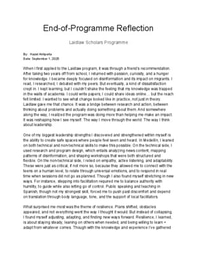Week 5 Log | LiA Reflection: Field Day!
What went well?
This week was the biggest milestone of the program. Everything from the previous weeks had been building up to this moment, and now the teens had the tools and perspective to go out into the field. Drawing inspiration from Humans of New York, I set the tone of the workshop by showing them how everyday stories could be framed truthfully and neutrally, from the perspective of the person being interviewed. My goal was to ensure that all the skills we had practiced—critical thinking, media framing, and voice—would come together here.
When I explained the plan to the team, they were surprised but in a positive way. I was nervous, mostly because I didn’t want the kids to get hurt while talking to strangers. But I reminded myself that they know the streets better than anyone—they know who to approach and who to avoid. With that in mind, I created a plan for navigating interviews: how to introduce myself, ask permission, build rapport, and then encourage adults to share their stories through open questions.
First, we analyzed examples from Humans of New York so the teens could see how to frame stories in the most authentic way possible. Second, I asked them to visualize what it means to be the interviewer—what posture, tone, and presence create trust. Finally, we divided them into groups, provided scripts, and prepared them to conduct their own interviews.
This part was especially important because, during the first week, many of the teens had expressed fear about interacting with strangers. They felt that no one would want to talk to them because of the comuna they came from, or that they would be seen as bothersome. This exercise was about reframing those beliefs: to show them that they have inherent value, and that simply being human and listening to another person is an act of worth.
Some observations:
- They were initially shy and hesitant to talk to strangers, but after the first interview, they couldn’t stop ‘pitching.’
They realized that people were not only willing to talk but often eager to share their stories. With that, the fear of rejection transformed into momentum. The very act of approaching a stranger, being acknowledged, and holding a conversation gave them validation.
- They started to know who to approach vs. who to avoid.
They began to practice discernment by choosing the right subject. One who can comfortably talk but also make sure they feel a connection with that person.
- They qualified meaningful vs. fluffed questions, as we all had only 20 minutes to interview.
Time constraints forced the teens to be intentional. At first, some filled the space with small talk or surface-level questions. But with only twenty minutes, they began to see the difference between filler questions and meaningful ones that opened up real insight. They learned how to move from closed questions (“Do you like this?”) to open ones (“Why does this matter to you?”).
- They realized the weight they carried when it comes to listening and writing to one’s story.
Perhaps the most powerful lesson came when they saw their role not just as interviewers but as caretakers of someone else’s voice. They understood that listening is not passive and writing is not neutral but a form of representation that carries consequences.
What could have been done differently?
I wished we had more time for editing and compilation of the work so they could present what they have, like in the previous weeks.
What did I learn about leadership?
This week taught me that leadership is about creating conditions for others to step into their own power. My role was not to provide the answers but to design the structure from the plan, the safety guidelines, the examples, that allowed the teens to discover for themselves that their voices matter. Watching them move from hesitation to momentum reminded me that confidence is built through experience. Leadership, in this sense, meant trusting them to take risks, even when I felt nervous about their safety, and recognizing that their knowledge of the streets was as important as my preparation.
What do I want to develop or focus on next week?
Reflection on the past few weeks has been go go go.

Please sign in
If you are a registered user on Laidlaw Scholars Network, please sign in